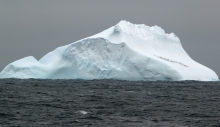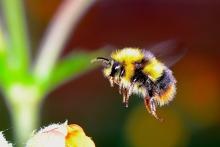
A Solvathon at the Bieler School of Environment, McGill University
Keynote speakers: Kim Stanley Robinson and Annalee Newitz
October 12-13, 2023

A Solvathon at the Bieler School of Environment, McGill University
Keynote speakers: Kim Stanley Robinson and Annalee Newitz
October 12-13, 2023
Here is the video recording of the 2023 Public Lecture.
The Bieler School of Environment presents:
Professor Gernot Wagner
2023 Environment Public Lecture
“Climate Risks, Uncertainties, and Opportunities"

A national survey of close to 1000 adults in Greenland (where approximately 90% of the population is Indigenous) conducted by a McGill University-led research team has found that a surprisingly large majority – 3 out of 4 Greenlanders – support extracting and exporting sand left by the melting ice sheet. A significant proportion want Greenland’s leadership to assess the impact of sand extraction and exports on both the environment and economy. Furthermore, when it comes to who mines the sand, the majority prefer local involvement to foreign collaboration.

Here are some interesting new stories from McGill University Media Relations:

To stop biodiversity loss, Canada recently committed to protecting 30% of its land and sea by 2030. But making conservation decisions about where to locate new protected areas is complicated. It depends on data both about biodiversity and about a range of benefits (e.g. freshwater, climate regulation, recreation) that people get from nature. Surprisingly, despite the size of the country, new mapping suggests that less than 1% of Canada’s land (0.6% of total area or approximately 56,000 km2) is a hotspot, providing all these benefits in one place.

To meet the most ambitious 1.5º C climate goal requires a rapid phaseout of fossil fuels and mass use of renewables. However, new international research by McGill University and the Institute of Environmental Science and Technology of the Universitat Autònoma de Barcelona (ICTA-UAB) warns that green energy projects can be as socially and environmentally conflictive as fossil fuel projects.

Over the past 40,000 years, ice sheets thousands of kilometres apart have influenced one another through sea level changes, according to research published today in Nature. New modelling of ice sheet changes during the most recent glacial cycle by a McGill-led team offers a clearer idea of the mechanisms that drive change than had previously existed and explains newly available geological records.

Scientists grappling with complex and seemingly unresolvable issues often refer to them as “wicked problems”. Arguably, some of the nastiest are those related to the deteriorating health of our environment.

While the COVID-19 pandemic continues to overshadow most other topics in 2020, Canadian activists are joining demonstrators around the world to bring climate change back into the conversation. Protests, walkouts, and sit-ins are expected to take place in several Canadian cities, including Vancouver, Ottawa, Montreal, and Halifax, on Friday and Saturday to mark the return of the global Fridays for Future movement led by Swedish activist Greta Thunberg.
Activists defending their communities and the surrounding environment against development of extractive industries and land grabs for agrarian use face high rates of criminalization, physical violence and murder around the world, according to a study published this month in the journal Global Environmental Change. The study, which analyzed 2,743 cases of environmental conflicts worldwide, found that despite the fact that these activists primarily use nonviolent forms of protest, they become victims of violence in 18 per cent of these conflicts and murder in 13 per cent of all cases.
Activists protesting against environmental injustices around the world suffer from high rates of criminalization, physical violence and murder, according to a study published this week in Global Environmental Change. Indeed, despite the fact that they primarily use nonviolent forms of protest, activists are victims of violence in 18% of environmental conflicts, and of murder in 13% of these conflicts. When Indigenous Peoples are involved, violence is especially frequent.
Australia continues to burn after more than a month of raging bushfires, and it doesn't appear the smoke-filled skies will be clearing any time soon. More than five million hectares have burned, 19 people have died, and 21 people are missing. Tens of thousands of people were forced to flee their homes. More than eight million more were under an emergency order. (CBC)
Here is an expert from McGill University that can provide comment on this issue:

Prime Minister Justin Trudeau is set to unveil his new cabinet Wednesday, with significant changes expected to important portfolios such as foreign affairs, environment and climate change, and intergovernmental affairs. (iPolitics)
Here are experts from McGill University that can provide comment on these topics:

Scientists have been looking at pollution affecting the air, land and water around the Athabasca Oil Sands for some time. After looking at contaminants in snow taken from up-to 25 km away from the oil sands, a McGill-led scientific team now suggests that oil sand pollution is also affecting the weather patterns in the surrounding regions.

Nature supports people in critical ways, often at a highly local level. A wild bee buzzes through a farm, pollinating vegetables as it goes. Nearby, wetlands remove chemicals from the farm’s runoff, protecting a community drinking water source. In communities all around the world, nature’s contributions are constantly flowing to people. A team of international scientists including from McGill University, have mapped these contributions at local levels for years, but a new Stanford-led study closes a critical gap in how this information can be used to drive global policy and development.